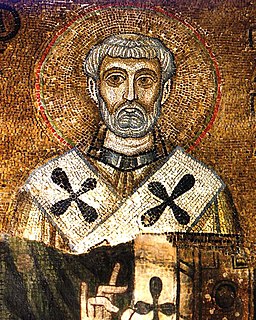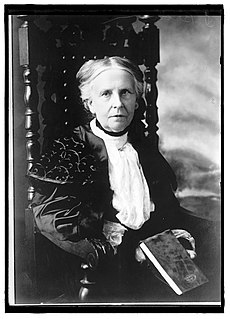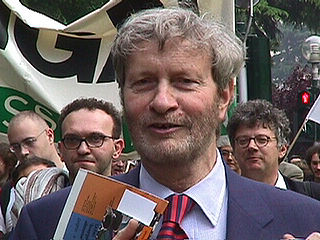A Quote by Irenaeus of Lyons
Suppose there arise a dispute relative to some important question among us, should we not have recourse to the most ancient Churches with which the apostles held constant intercourse, and learn from them what is certain and clear in regard to the present question? For how should it be if the apostles themselves had not left us writings? Would it not be necessary, in that case, to follow the course of the tradition which they handed down to those to whom they did commit the Churches?
Quote Topics
Among
Ancient
Apostles
Arise
Case
Certain
Churches
Clear
Commit
Constant
Course
Did
Dispute
Down
Follow
Had
Handed
Held
How
Important
Important Question
Intercourse
Learn
Left
Most
Necessary
Present
Question
Recourse
Regard
Relative
Should
Should I
Some
Suppose
Them
Themselves
Those
Tradition
Us
Which
Whom
Would
Related Quotes
Seeing there are many who think they hold the opinions of Christ, and yet some of these think differently from their predecessors, yet as the teaching of the Church, transmitted in orderly succession from the apostles, and remaining in the Churches to the present day, is still preserved, that alone is to be accepted as truth which differs in no respect from ecclesiastical and apostolica tradition.
How we shall earn our bread is a grave question; yet it is a sweet and inviting question. Let us not shirk it, as is usually done.It is the most important and practical question which is put to man. Let us not answer it hastily. Let us not be content to get our bread in some gross, careless, and hasty manner. Some men go a-hunting, some a-fishing, some a-gaming, some to war; but none have so pleasant a time as they who in earnest seek to earn their bread.
... faithfully and strenuously you should resist the heretics in defense of the only true and life-giving faith, which the Church has received - the apostles and imparted to her sons. For the Lord of all gave to His apostles the power of the Gospel, through whom also we have known the truth, that is, the doctrine of the Son of God: to whom also did the Lord declare: 'He who hears you, hears Me; and he who despises you, despises Me, and Him who sent Me' (Lk. 10:16).
The churches that are growing and thriving are churches that I would call evangelical and orthodox for the most part in their beliefs. They are churches that tend to evangelize ... and encourage their people to share their faith. These are the churches that are actually growing. The ones that are shrinking are the ones that are compromising and watering down what the word of God says.
But I hope that by the decision and authority of wise princes that sometime devout and learned men from the churches of other nations and of ours may be summoned together to deliberate about all the controversies and that there be handed down to posterity one harmonious, true, and clear form of doctrine, without any ambiguity. Meanwhile, as far as possible, let us encourage the union of our churches with measured advice.
The question should not be whether or not police are allowed to confront suspects; it should be about how we train them. The question should not be whether we have police; it should be how we use them. The question should not be whether judges should have the ability to protect New Yorkers from violent offenders; it should be how we let them.
[I believe] that animals have a worth in and of themselves, and that they are not inferior to human beings but rather just different from us, and that they really don't exist for us nor do they belong to us...it should not be a question of how they should be treated within the context of their usefulness, or perceived usefulness, to us, but rather whether we have a right to use them at all.
Tradition is the transmitting of linguistic messages that constitute the horizon within which Dasein is thrown as a historically determined project: and tradition derives its importance from the fact that Being, as a horizon of disclosure in which things appear, can arise only as a trace of past words or as an announcement that has been handed down to us.
I can say that China has been cooperating with India to search for solutions. On some issues, it's a question of principles for them. On some issues, it's a question of principles for us. On some issues they differ with us and there are issues on which we differ with them. There are some basic differences. But the most important thing is that we can speak to China eye-to-eye and put forth India's interests in the most unambiguous manner.
As to those other things which we hold on the authority, not of Scripture, but of tradition, and which are observed throughout the whole world, it may be understood that they are held as approved and instituted either by the apostles themselves, or by plenary Councils, whose authority in the Church is most useful, e.g. the annual commemoration, by special solemnities, of the Lord's passion, resurrection, and ascension, and of the descent of the Holy Spirit from heaven, and whatever else is in like manner observed by the whole Church wherever it has been established.
A dialogue is very important. It is a form of communication in which question and answer continue till a question is left without an answer. Thus the question is suspended between the two persons involved in this answer and question. It is like a bud with untouched blossoms . . . If the question is left totally untouched by thought, it then has its own answer because the questioner and answerer, as persons, have disappeared. This is a form of dialogue in which investigation reaches a certain point of intensity and depth, which then has a quality that thought can never reach.









































